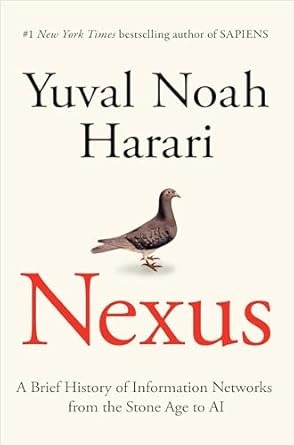Nexus: A Brief History of Information Networks from the Stone Age to AI - An Unveiling Review
Yuval Noah Harari's *Nexus* explores the evolution of information networks from the Stone Age to the era of AI, offering profound insights into how these networks have shaped human civilization. With a meticulous interdisciplinary approach, Harari's narrative is both timely and impactful, addressing current existential crises and the future of information flow.
Table of Contents
Nexus: A Brief History of Information Networks from the Stone Age to AI - An Unveiling Review
Author: Yuval Noah Harari
Genre: History / Information Science
Publication Date: Link to Amazon
Introduction
If you've been fascinated by how humankind has evolved, especially through the lens of information and networks, then Yuval Noah Harari's latest masterpiece, Nexus: A Brief History of Information Networks from the Stone Age to AI, is a must-read. Harari, best known for his groundbreaking works such as Sapiens and Homo Deus, once again dazzles us with his ability to weave intricate historical narratives with profound philosophical insights.
The Hidden Side of Nexus
What makes Nexus stand out in the crowded world of historical and philosophical literature is its comprehensive exploration of how information networks have fundamentally shaped our world. From the earliest days of human communication in the Stone Age to the complexities of AI today, Harari doesn’t just recount history; he reinterprets it through the lens of information flow. This book reveals the unseen currents that have driven human societies forward—or, at times, backward.
A Deep Dive into Harari's Creative Process
One of the more fascinating aspects of Nexus is the meticulous research and interdisciplinary approach Harari employs. Drawing on history, philosophy, science, psychology, and political theory, Harari presents a plethora of examples that illustrate how information has been the lifeblood of human civilization. His ability to untangle complex patterns and reveal their connections to our everyday lives is nothing short of genius.
The Era of Creation
Harari's timing couldn't be more impeccable. As we teeter on the edge of an era dominated by AI and automated content production, the book serves as a critical guide for understanding the implications of these technologies. Harari addresses the existential crises we face today—ecological collapse, misinformation, and the dangers posed by AI—with the wisdom of a seasoned historian and the foresight of a philosopher.
Why Nexus Became a Bestseller
Relevance and Timeliness
One of the fundamental reasons Nexus became a bestseller is its immediate relevance. In a world overwhelmed by information and misinformation, Harari’s exploration offers a much-needed perspective. The book is a timely reflection on how we got here and where we might be headed, making it indispensable for anyone concerned about the future.
Harari's Unique Voice
Harari has a unique ability to unite history’s finest details with its grandest megatrends, making his work accessible yet profoundly impactful. His narrative style is both engaging and thought-provoking, a balance that few authors manage to strike. This, combined with his reputation as one of the world's most influential public intellectuals, ensures that his books capture widespread attention.
The Human Connection
Despite its broad scope, Nexus never loses sight of the human element. Harari’s exploration of information networks ultimately rediscover our shared humanity. By examining the complex relationship between information and truth, bureaucracy and mythology, wisdom and power, he makes us ponder our collective journey and the urgent choices we face.
Lessons to Learn and Imitate
Interdisciplinary Approach
One of the key takeaways from Harari’s work is the importance of an interdisciplinary approach. By combining insights from various fields, Harari provides a richer, more nuanced understanding of his subject. Aspiring writers and thinkers can learn from this by not confining themselves to a single discipline.
Relevance to Current Issues
Another lesson is the importance of addressing current, relevant issues. Nexus resonates because it speaks directly to the challenges we face today. Writers and creators should strive to make their work timely and relevant, addressing the pressing issues of their era.
Engaging Storytelling
Harari’s ability to make complex subjects engaging is a skill worth emulating. His use of narrative to illuminate intricate concepts makes his work accessible to a broad audience. Storytellers should aim to blend depth with readability, making their work both informative and captivating.
Conclusion
Nexus: A Brief History of Information Networks from the Stone Age to AI is more than just a historical account; it’s a profound exploration of the forces that have shaped human civilization. Harari’s masterful storytelling, combined with his interdisciplinary approach and timely relevance, makes this book an indispensable read. As we navigate the complexities of the modern world, Nexus offers invaluable insights and a deeper understanding of our shared journey.
Feel free to share your thoughts in the comments below. Have you read Nexus? What were your key takeaways? Let's discuss!
Story updated onSeptember 3, 2024
Table of Contents

Nexus: A Brief History of Information Networks from the Stone Age to AI
Yuval Noah Harari